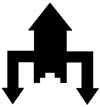(published March 24, 2005)

Sick as Hell last night, owing to having several sodas and half a large pizza at 10:30 pm. Bad gut. Slept in my reclining chair—to which my partner regularly relegates me when I am gastrointestinally distressed—awakening after midnight to find myself sleepwalked into the bathroom, already sitting on the can with a bullety stream of loose stool on the verge of exploding out of me. Somewhere in that muddled betwixtspace I found myself gripped by the profound and complete conviction that there was a quality of that charging stool stream that was deep and cleansing and both like a steam-powered bullet train charging through and down my rectal colon and like Jesus.
Yes, Jesus. That Jesus. I could see him, in my head: Glorious, gilded, glowing, arms out-stretched, eyes pitying, knowing, unimpressed.
And as the excrement charged out, with the speed and directness of a perfectly fletched arrow, I felt an ecstasy—not in its erotic, colloquial usage, but a literal out-of-bodiness, a sense of being apart from my earthy form, complete and separate and able to impartially, impassionately view and evaluate the form's state and what was transpiring. And, like Jesus, aloof from this mundane, visceral business, I was similarly unimpressed with what I saw: My own wretched, quivering form perched on the toilet, cramping, purging. I believe the old Greeks would have called the situation cathartic.
As the stream—which, though loose itself, was quiet solid with velocity, like the jet of a fire hose—shot out of my posterior and buried itself in the porceline bowl's water, I found myself relaxed into a state of grace.
Intestinal cramping, loose bowels, locomotives and the Lord; ecstasy, purging, catharsis and grace, all in the bathroom—the sancta sanctorum of the American home—all on an early Thursday morning, cold and snowy and clear: Fucked Up.
And, of course, jotting now, I can't help but recall Fritz's own tender musings on a very similar topic some weeks back.
Which is all to say, it is fascinating to see how rarely it is our hearts or minds which clue us in to the more numinous qualities of this Vale of Tears, and how often it is our bowels.
For the Thoroughly Curious: I had the same pizza the next day for dinner—though much earlier, and in lesser amount—with no such similar results. The Lord works in mysterious ways.
Share on Facebook
![]() Tweet about this Piece
Tweet about this Piece
by Alan Benard
by Morgan Johnson
by J. Sallini-Genovese
or
The Irish Are Luckless Bastards, and Their Wives Cheap As Hell!
by Mark Twain
by Max Montesino
by David Erik Nelson
Rant Archives